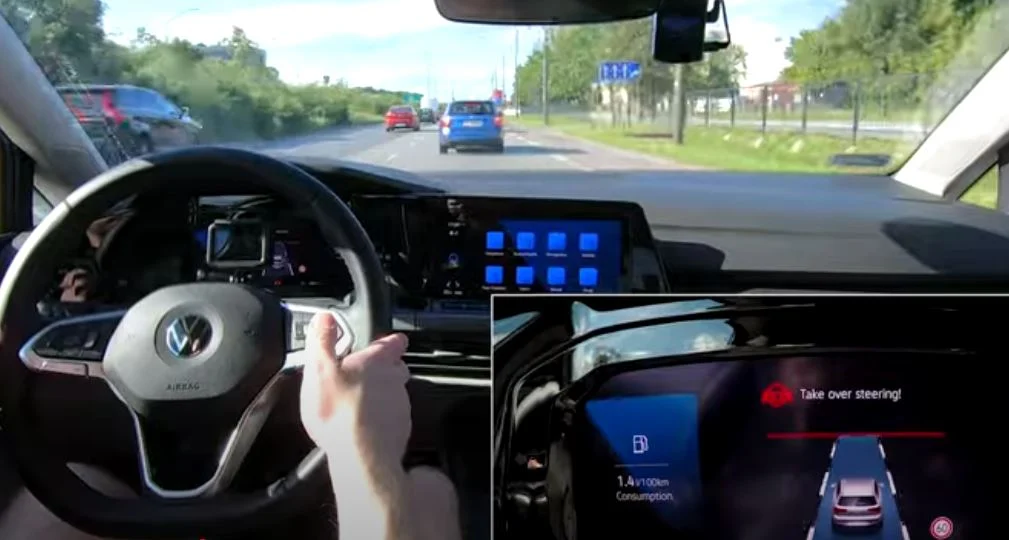Physical Address
304 North Cardinal St.
Dorchester Center, MA 02124
Physical Address
304 North Cardinal St.
Dorchester Center, MA 02124


The loudest innovation doesn’t always have the greatest impact in the rapidly changing field of smart mobility. Sometimes the technology that operates in the background—subtle, reliable, and incredibly efficient—rewires our perception of the road. Now for Volkswagen’s Travel Assist.
While it may not be able to drive you across the country while you sleep, this semi-autonomous system does provide a very human-like combination of awareness and help. Travel Assist is not only practical, but also revolutionary in the face of protracted commutes, congested highways, and erratic weather.
| Feature | Details |
|---|---|
| Name | Travel Assist |
| Integrated Systems | Adaptive Cruise Control (ACC), Lane Assist, Emergency Assist, Predictive Cruise Control |
| Automation Level | Level 2 (Semi-Autonomous Driving) |
| Core Capabilities | Maintains lane position, adjusts speed, keeps distance from vehicles, responds to road curvature |
| Compatible Models | Volkswagen ID.3, ID.4, ID.7, Golf, Passat, Touareg, ID.Buzz (varies by region) |
| Key Safety Tools | Cornering Assist, Emergency Stop Assist, Swarm Data Integration |
| Custom Driver Input | Lane centering adjustments, adaptive positioning preferences |
| Best Use Cases | Highway driving, long-distance commutes, stop-and-go traffic conditions |
The morning commute is a stressful daily routine for many drivers, filled with erratic lane changes, constant braking, and mental exhaustion. Travel Assist functions almost like an additional pair of hands and eyes, addressing these contemporary driving pain points with surprisingly thoughtful design.
Volkswagen has developed a system that anticipates rather than just reacts by integrating proactive speed regulation, adaptive cruise control, and lane keeping. The car reacts to changes in speed zones, curves, and roundabouts with a sort of anticipatory logic that is, dare we say, intuitive.

Volkswagen has taken a refreshingly practical stance in contrast to some rivals who promise fully autonomous features that still perform poorly in practical situations. The goal of Travel Assist is very clear: it is meant to assist the driver, not to take their place.
For instance, Travel Assist gently keeps you in the lane when it is activated. However, depending on your driving style, it permits slight shifts to the left or right rather than strictly adhering to the dead center. This behavior lends the system a natural feel that fosters trust rather than mistrust because it is remarkably similar to how actual humans drive.
Travel Assist uses real-time data and sophisticated GPS integration to plan for the future rather than just responding to current events. It instantly adjusts to new speed limits and slows the vehicle before abrupt turns. When driving long distances or in stop-and-go traffic, where driver fatigue usually sets in, that proactive behavior is especially helpful.
Travel Assist will become even more intelligent in the upcoming years as swarm data becomes more common. Imagine a swarm of data, like bees in a hive, keeping each other informed and in sync as thousands of cars anonymously share road conditions in real time.
Emergency Assist is among Travel Assist’s most underappreciated features. The system gently assumes control, slows the car, and activates the hazard lights if the driver loses consciousness—due to exhaustion, an illness, or distraction.
This isn’t merely a technological feature. It’s a silent protective measure that might avert mishaps and save lives. That kind of backup not only feels smart, but it also feels caring in a time when driving carries a greater mental burden than ever before.
Volkswagen’s IQ.DRIVE initiative, a forward-thinking collection of technologies intended to lower human error, improve comfort, and elevate daily driving, includes Travel Assist. Volkswagen is merely giving your hands and mind a little well-earned rest, not asking you to give up the wheel like full autonomy evangelists do.
Travel Assist keeps improving through system enhancements and software upgrades. It is incredibly resilient as a long-term investment because it learns, gets better, and adapts. That kind of longevity is uncommon in a world where technology is rapidly becoming obsolete.
Users are speaking out more and more on review sites and forums about how much more comfortable and stress-free their experiences are when Travel Assist is involved. “Driving with a silent copilot who never gets tired, never yells, and never takes a wrong turn” is how one ID.4 owner described it.
According to another, it made her 90-minute drive through congested traffic feel “surprisingly manageable,” enabling her to get home with greater vigor and less stress.
These experiences are not unique; rather, they are becoming commonplace.
It is more important than ever to have technology that supports rather than overwhelms in the fast-paced world of today. That change is reflected in Travel Assist. It provides trustworthy, wise support in the present rather than trying to enchant you with sci-fi fantasies.
Travel Assist simplifies essential driving tasks and frees up mental space so you can concentrate on what really counts—the road ahead, your environment, and, most importantly, your mental health.
Is Travel Assist fully autonomous?
No, it’s Level 2 semi-autonomous and requires driver engagement.
How do I activate it?
Press the Travel Assist button on your steering wheel while driving steadily.
Can it handle stop-and-go traffic?
Yes, it’s highly efficient in slow, congested driving situations.
Is it available on all VW models?
It’s available on select models like ID.3, ID.4, ID.7, Golf, and Touareg.
What makes it different from standard cruise control?
It combines speed, steering, lane guidance, and real-time adaptation for a far more intelligent drive.